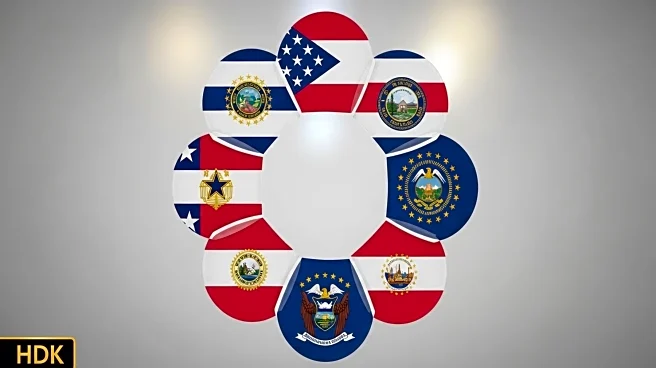What is the story about?
What's Happening?
State leaders across the U.S. are crafting their own vaccine policies in response to recent federal changes. Concerns have arisen due to staff and budget cuts at federal health agencies, the firing of prominent doctors from vaccine advisory committees, and the resignation of top leaders from the Centers for Disease Control and Prevention (CDC). The tipping point was the Food and Drug Administration's decision to limit eligibility for the fall COVID shot to those 65 and older or those with health risks, prompting states like New York, Massachusetts, and New Mexico to take independent action. Some states are forming regional health coalitions, such as the West Coast Health Alliance, to coordinate vaccine recommendations. These moves aim to ensure access to COVID vaccines and maintain public health standards.
Why It's Important?
The shift towards state-specific vaccine policies highlights a growing concern over the credibility and effectiveness of federal health agencies. This decentralization could lead to varied vaccine access and recommendations across states, affecting public health outcomes. States with Democratic governors are taking steps to protect vaccine access, while Republican-led states like Florida are moving to end vaccine mandates. The lack of a unified federal approach may result in confusion for consumers regarding vaccine availability and insurance coverage. This situation underscores the importance of reliable, science-based health information and the potential impact on public trust in health interventions.
What's Next?
The CDC's Advisory Committee on Immunization Practices is scheduled to meet later this month to review COVID vaccines, which may influence state decisions. States are diversifying their sources for vaccine information, referencing organizations like the American Academy of Pediatrics and the Vaccine Integrity Project. State health officials will closely monitor the CDC's revamped vaccine advisory committee's recommendations, which could affect policies on COVID, Hepatitis B, and other vaccines. The evolving landscape requires consumers to seek information from trusted sources and understand their insurance coverage for vaccines.
Beyond the Headlines
The development of independent state vaccine policies raises ethical and legal questions about the role of federal agencies in public health. The changes may lead to long-term shifts in how health policies are crafted and implemented, potentially affecting the balance between state and federal authority. The situation also highlights the cultural dimensions of vaccine acceptance and the influence of political ideologies on health decisions.

















